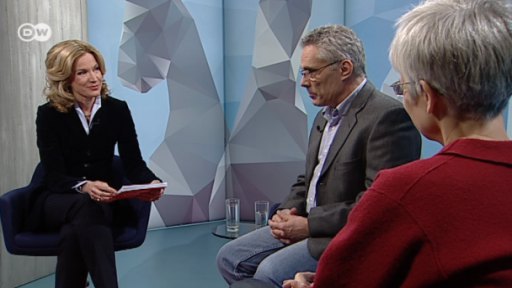Quadriga - Germany Under Pressure: New Deal for Greece?

This browser does not support the video element.
Austerity measures have so far failed to promote economic recovery in Greece. Instead, government debt has risen further, unemployment is at 27% and the health system has been left in tatters.
Finance minister Yanis Varoufakis has dropped talk of a debt haircut. Instead, he’s calling for the country’s debt to be restructured. That could involve making repayments contingent upon economic growth or issuing bonds without a maturity date.
Those plans are likely to be met with favor from Italy and France. Germany, on the other hand, continues to insist that Greece deliver on previously agreed reforms. That is leaving Chancellor Angela Merkel looking increasingly isolated. Time is of the essence. If the Greek government fails to reach an agreement on how to deal with the debt crisis by the end of the month, the country could soon run out of money.
Will Germany relent and go back on its insistence on austerity? What effect will the power struggle between Tsipras, the EU and Berlin have on wider power relations in Europe? Could this result in a showdown after all? Is the prospect of a Greek exit from the Eurozone still on the cards?
Germany Under Pressure: New Deal for Greece?
What do you think? Write to us: Quadriga[at]dw.de
Our guests:
Ulrike Herrmann – started her career in banking before taking up journalism at the renowned Henri Nannen School. After that she studied history and philosophy at Berlin’s Free University. She then worked as a research assistant at the Körber Foundation and was the press officer for Hamburg’s Equal Opportunities minister. For several years, she has been a political correspondent and business editor at the Berlin daily "taz".
Friedrich Thelen - After earning his doctorate in law, in 1975 he took on the post of director at the German Development Service. Friedrich Thelen then worked as a journalist for the leading weekly newspaper "Die Zeit". In 1978 he switched to the business weekly "Wirtschaftswoche", where he began his career as the magazine's Bonn correspondent and bureau chief. Later he became the bureau chief of Wirtschaftswoche's Berlin office. He currently heads his own consulting office.
Theodore Kouvakas - studied art history in Florence and architecture in Venice, and trained to become a journalist. In the 1980s, he wrote for a range of media outlets. Kouvakas covered foreign policy and financial markets for Imerissia SA, a financial and business newspaper. In 2010 he was made the Berlin correspondent for Real Media SA. Afterwards he worked as the Berlin correspondent for the Greek daily Eleftherotypia. Since 2015 he works from Berlin as a freelance journalist for several greek media. His areas of expertise include European financial markets and foreign policy.